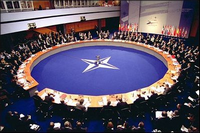A constant refrain of the Democratic party's foreign policy establishment during the administration of former President George W. Bush was that, in contrast to "unilateralist" Republicans with their cosmetic "coalitions of the willing," Democrats were more skilled at constructing durable international partnerships that would lead to true burden-sharing.
The assertion, which became almost an article of faith, served as the basis for John Kerry's 2004 campaign promise that, if elected, he would be able to secure broader multilateral troop contributions in Iraq to relieve the burden on U.S. troops there. In the 2008 election, the same faith, combined with a belief based on some of his stump speeches that, as president, Barack Obama would quickly but responsibly wind down U.S. involvement in overseas wars in order to concentrate on pressing domestic concerns, was part of the reason Democrats retook the White House and extended their Congressional majorities. In contrast, John McCain's off-the-cuff remark that the United States might need to keep forces in Iraq "for a hundred years" came back to haunt him.
More than halfway through Obama's first term, however, these promises haven't quite panned out. It is true that NATO allies did make modest troop increases in Afghanistan, and the "reset" with Russia did develop the Northern Distribution Network as an alternative supply route for coalition forces there, reducing dependence on Pakistan. But those who had hopes for transforming the Afghan operation into a Gulf War-style coalition, particularly in terms of having other countries step up to provide more of the financing, have been disappointed. The United States, both on its own and as part of the NATO operation, is still providing the lion's share of the blood and treasure, especially in light of the January 2010 surge. Yes, the Libya operation is less of an American show, but Washington is still required to provide many of the capabilities and to act as the munitions supplier of last resort in that effort.

